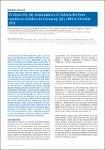Evidence for the transmission of Salmonella from reptiles to children in Germany, July 2010 to October 2011
Pees, Michael
Rabsch, Wolfgang
Plenz, B.
Fruth, Angelika
Prager, Rita
Simon, Sandra
Schmidt, V.
Münch, Sebastian
Braun, Peggy
This study examines the Salmonella status in reptiles kept in households with children suffering from gastroenteritis due to an exotic Salmonella serovar, to obtain information on possible transmission paths. A number of affected households (n=79) were contacted, and almost half (34/79) comprised at least one reptile in the home. Of the households, 19 were further studied, whereby a total of 36 reptiles were investigated. Samples were taken from the reptiles including the oral cavity, the cloaca, the skin and, in the case of lizards, the stomach, and isolation of Salmonella strains was performed using repeated enrichment and typing. Where the Salmonella serovars of the infected child and the reptile were identical, typing was followed by pulsed-field gel electrophoresis (PFGE). Bearded dragons (Pogona vitticeps) constituted 19 of 36 examined reptiles. Altogether 319 Salmonella isolates were investigated and 24 different serovars identified in the reptiles. In 15 of 19 households, an identical serovar to the human case was confirmed in at least one reptile (including 16 of all 19 bearded dragons examined). The results demonstrate that reptiles and especially bearded dragons shed various Salmonella serovars including those isolated from infected children in the respective households. Hygiene protocols and parents’ education are therefore highly necessary to reduce the risk of transmission. From a terminological point of view, we propose to call such infections ‘Reptile-Exotic-Pet-Associated-Salmonellosis’ (REPAS).
No license information
Related Items
Show related Items with similar Title, Author, Creator or Subject.
-
2013-03-21ZeitschriftenartikelTyping of Salmonella enterica serovar Infantis isolates from 51 outbreaks in Germany between 1974 and 2009 by a novel phage-typing scheme Miller, Tatjana; Braun, Peggy; Fehlhaber, K.; Prager, Rita; Pfeifer, Yvonne; Rabsch, WolfgangWe developed a new phage-typing method and evaluated its application in combination with XbaI macrorestriction analysis by pulsed-field gel electrophoresis (PFGE) as a useful tool for the long-term epidemiology of Salmonella ...
-
2010-05-14ZeitschriftenartikelPork contaminated with Salmonella enterica serovar 4,[5],12:i:-, an emerging health risk for humans. Hauser, Elisabeth; Tietze, Erhard; Helmuth, Reiner; Junker, Ernst; Blank, Kathrin; Prager, Rita; Rabsch, Wolfgang; Appel, Bernd; Fruth, Angelika; Malorny, BurkhardSalmonella enterica subsp. enterica serovar 4,[5],12:i:- is a monophasic variant of S. enterica serovar Typhimurium (antigenic formula 4,[5],12:i:1,2). Worldwide, especially in several European countries and the United ...
-
2014-08-07ZeitschriftenartikelA multi-country outbreak of Salmonella Newport gastroenteritis in Europe associated with watermelon from Brazil, confirmed by whole genome sequencing: October 2011 to January 2012 Byrne, Lisa; Fisher, I.; Peters, T.; Mather, A.; Thomson, N.; Rosner, Bettina; Bernard, Helen; McKeown, P.; Cormican, M.; Cowden, J.; Aiyedun, V.; Lane, C.In November 2011, the presence of Salmonella Newport in a ready-to-eat watermelon slice was confirmed as part of a local food survey in England. In late December 2011, cases of S. Newport were reported in England, Wales, ...

